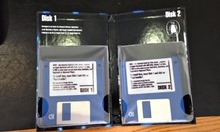 The Guardian has taken a look back at early e-books, trying to determine when they began. One example the article points out is a novel called Host, published as a publicity stunt on two floppy disks in 1993. Since the book was about a scientist who downloads his mind into a computer, I imagine it seemed like a natural way to drum up some publicity. The Bookseller reports that London’s Science Museum has accepted the book for display as “the world’s first electronic novel,” but there seems to be some question as to whether that’s really true.
The Guardian has taken a look back at early e-books, trying to determine when they began. One example the article points out is a novel called Host, published as a publicity stunt on two floppy disks in 1993. Since the book was about a scientist who downloads his mind into a computer, I imagine it seemed like a natural way to drum up some publicity. The Bookseller reports that London’s Science Museum has accepted the book for display as “the world’s first electronic novel,” but there seems to be some question as to whether that’s really true.
As the Guardian notes, Project Gutenberg had launched in 1971, and had posted its tenth e-book by 1989. There were plenty of text and interactive storytelling adventure games from the 1980s, and an electronic book called Uncle Roger was released in 1987 for computers like the Apple IIe. The article mentions a 1989-90 hypertext story called Afternoon: a story, another early e-literature inspiration.
And there’s a link to an academic site on “Electronic Literature & Its Emerging Forms,” which seeks to chronicle the history of such early electronic publications.
Between these, and the online writing forums I described in my “Paleo E-Books” series, it seems like there was an awful lot of online writing activity back in the days before anyone had even invented the “e-book” terminology. And, of course, science fiction writers like Ben Bova had been putting a lot of thought into the idea, too.
Regardless, it’s good to remember that e-books existed before Amazon, and even before Peanut Press and Fictionwise. They didn’t just come out of nowhere.

































According to the 2003 edition of ELECTRONIC PUBLISHING: THE DEFINITIVE GUIDE, (Karen S. Weisner, ed.), there were several ebook publishers in the early 70s including Mind’s Eye Fiction so “The Guardian” isn’t remotely right unless they consider “real” publishing only to be done by traditional publishers.
Weisner’s 2003 ELECTRONIC PUBLISHING is no longer in print, e or p, but it’s more than worth the time and cost to find it used because of its article on the history of epublishing.
I used to download stories, some novel length, from a local BBS devoted to creative writing in the mid-80s. The download area included reading apps for various computers (just .TXT file viewers really, but still the whole thing was quite organized, with some of the better programs allowing users to change screen colors or paragraph width for more comfortable reading). Really not so different from now except there was no commercial component to it.
I even downloaded elaborate e-zines from other BBSes, wrapped in reading apps that included custom fonts, sound, music, and sometimes interactive elements.
Quantum Link, the Commodore 64-based predecessor to AOL, also had a download section that included stories of various genres and length. I don’t think it was terribly popular compared to the games section or other offerings of the service, but I did download a few stories from there, paying money to do so actually since the service charged extra for time spent downloading third-party files.
The Guardian missed an important stage in the history–the multi-media CD-ROM craze of the late 1980s. I did contract work on the digital version of a business book for Microsoft Press. At that time, the idea made little sense. Microsoft was testing the waters and finding them a bit too chilly.
About 12 years ago, I remember getting quite a lot of book/story downloads from Blackmask online website (now gone)., It mostly featured pulp magazine stories (Black Mask was a major pulp mag in the 1930’s and 40’s). I even purchased from them a few CD roms which contained complete runs of Shadow and Doc Savage which I still use to read on my Kindle. (I now realize that those cd roms where probably pirated as I thought the stories were in the public domain). And, I used to read them on my Franklin Book reader (which wasn’t very good).
Blackmask isn’t exactly gone. It just had to change its name to Munsey’s and take down all the questionably-copyrighted works in the wake of its disastrous game of copyright chicken with Condé Nast. I got a few of their CD and DVD-ROMs myself. You can sometimes find the ISOs floating around on BitTorrent.